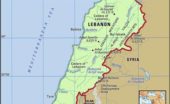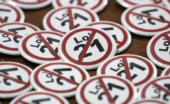Molly Minturn - My family is heartbroken to share that my father died in surgery on Monday, Feb. 10. It…
Reasonable Accommodation 2011 – Updates
Written by Diana Thebaud Nicholson // January 10, 2014 // Québec, Rights & Social justice // 1 Comment
Raheel Raza: Competing Human Rights in Canada
Reasonable accommodation is good when not imposed from the top down. Reasonable accommodation is the multifaith chapel at Toronto airport with a large section for Muslims; unreasonable accommodation is the Muslim airport employee who insists on a separate room allocated only for him or her.
Reasonable accommodation is including Muslim books in the library; unreasonable accommodation is the demand to eliminate the Three Little Pigs from a traditional story. Reasonable accommodation is celebrating our religious holidays with joy; unreasonable accommodation is criticizing others who wish to say Merry Christmas and celebrate their culture, too.
Many of us who come from theocratic and patriarchal countries are wholly dependent on Canada’s liberal, secular values of gender equality to maintain our freedom — which others are working so tirelessly to curtail.
York University’s decision to allow gender segregation suffocates and chokes the very values that make this country, and others like it, the great liberal, secular democracy we came here to seek.
10 January
Andrew Coyne: York accommodation and Quebec values charter aren’t opposites, in fact they are the same
Is this the dreaded pragmatism? Am I suggesting we should just do “what works,” unburdened by the a priori, in effect making it up as we go along? Not at all. Rules are fine things. We need rules: to structure our thinking, to avoid unfairness, to make the decisions of those in power — our rulers — predictable or at least intelligible. But a blind adherence to simplistic rules, devoid of context or judgment, is precisely what Emerson meant by “a foolish consistency.”
If rules must be informed by judgment, judgment is itself properly informed by, well, rules. If we are to do “what works,” we have to have some idea of what “what works” looks like, what criteria we should apply to distinguish success from failure. If inflexible purism is to be avoided, so is aimless, rootless compromise, as if wisdom were always to be found in half-measures.
Rather, judgment seems to me to consist in what one might call structured compromise. We should be willing, if necessary, to bend a rule or water down a principle, but only so far, and only in acknowledgment of some other, competing principle. How far? We have a good working model, I think, in the famous four-part Oakes test, named for one of the Supreme Court’s early post-Charter of Rights decisions. It is supposed to guide the court’s thinking in deciding whether a given law may be considered a “reasonable limit” on Charter rights, but the logic can be applied more generally.
For any proposed compromise, that is, ask first: is it a matter of some urgency — in the court’s language, is it aimed at some “pressing and substantial objective”? Second, is it likely to achieve it: is it “rationally connected” to the objective? Third, is there some other way to achieve the same objective at less harm to principle: does it “minimally impair” it? Last, simply, is the good achieved proportional to the harm?
If either the officials at York or the government of Quebec had applied this model to the questions before them they might have come to very different conclusions, neither bending to the demands of religious observance in the first case, nor refusing to do so in the second. Like them, we all might prefer the comfort of rules. Alas, we are condemned to use our judgment.
Gérard Bouchard: La démagogie au pouvoir
(La Presse) Qu’on soit d’accord ou non avec le projet de charte, on ne peut que déplorer les procédés utilisés par les dirigeants péquistes pour en faire la promotion. En jetant un regard sur les derniers mois, voici ce que les faits donnent à voir.
Mensonges et distorsions
Sans s’appuyer sur aucune étude, le ministre Drainville répète que la pratique des accommodements religieux viole les valeurs du Québec, notamment l’égalité homme-femme, et qu’on fait face à une accumulation de demandes déraisonnables.
Il affirme aussi que les accommodements créent des inégalités, des privilèges, et qu’ils souffrent d’une absence de balises, donnant ainsi à entendre que les demandeurs n’en font qu’à leur tête. Les Québécois, bonasses, laisseraient faire. Conclusion: il faut d’urgence mettre fin à ces dérapages, il est temps de se tenir debout (ou, selon la très élégante expression du ministre, de «mettre ses culottes»).
Jean-François Lisée: Quebec’s Latest Stand
In a very real sense, the debate over Quebec’s charter may be the last stand of Canada’s multiculturalist experiment. Whatever the immediate outcome, it may be only a matter of time until Canadian multiculturalism finds itself buried alongside its European siblings.
(NYT) Last fall, the European backlash against multiculturalism crossed the Atlantic and landed in Quebec, when the governing Parti Québécois proposed the Charter of Values, which sets out a vision of government that breaks sharply with Canada’s broader multicultural ethos. …
The Charter of Values is the latest expression of Quebec’s dim view of multiculturalism. Among other things, the bill affirms the secular nature of Quebec’s government and denies religious requests for accommodations of dress in public sector employment: After a transition period, government workers would have to refrain from wearing conspicuous religious symbols — for instance, the Muslim hijab, the Sikh turban or the Christian cross — while on the job.
As usual, though, when Quebec veers from the Canadian path, controversy breaks out. The Ottowan government has even vowed to challenge the charter in the national courts if it passes. Critics are claiming that the bill infringes on the liberties of Muslims and other minorities. Oddly, though, they do not balk at the current ban, for all government workers, on the expression of other social or political beliefs through their attire.
9 January
York University Dean supports student’s religious right to Aztec human sacrifice — the right way to treat these ridiculous stories
(The Beaverton) After permitting a student to be excused from course work on religious grounds so he would not have to publicly interact with female peers, the Dean of York University is also permitting another student to have the right to ritually murder people to appease his gods.
“We are legally obliged to heed to the student’s wishes of human sacrifice” said Dr. Martin Singer, Dean of the faculty of Arts and Science at the university. “This wouldn’t affect many students as the festival of Tlacaxipehualiztli only lasts 20 days to celebrate the spring equinox and sometimes occurs during reading week. Additionally, the student has assured me that obsidian blades are so sharp that you will barely feel them.”
After previously being denied his right to cut open the chests and tear out the beating hearts of human beings to satisfy Xipe Totec by his history professor, the Dean quickly intervened.
“I understand that people may be uncomfortable with the idea of firing arrows at someone tied to a wooden board until their blood fills a copper bowl, but York University is an inclusive campus that appreciates the values of all religions,” the Dean added.
8 January
A new twist – and not from Quebec
Religious accommodation or ‘accessory to sexism’? York student’s case stirs debate
A student’s request to be excused from course work on religious grounds so he would not have to interact with female peers has opened a fractious debate over how institutions navigate between competing human rights.
J. Paul Grayson, a sociology professor at York University, received the request in September and denied it, arguing it would give tacit support to a negative view of women. But the dean of the faculty of arts disagreed and has ordered him to grant the accommodation.
2013
… modern scholarship has established that the fleur-de-lis was a religious symbol before it was a true heraldic symbol. [21] Along with true lilies, it was associated with the Virgin Mary, and in the 12th century Louis VI and Louis VII started to use the emblem, on sceptres for example, so connecting their rulership with this symbol of saintliness. Wikipedia
The introduction of the Quebec Charter of Values merits a page all of its own
14 June
Globe editorial — Beware the Charter of Quebec Values
Judicially speaking, [Quebec] cannot sprint off in a different direction from the rest of Canada without provoking court challenges, even if it does define its society differently. But it doesn’t need to, either. The model is transferable. What could be more positive than a vibrant French-speaking culture that welcomes immigrants and accommodates their desire to wear turbans on soccer pitches while insisting on a progressive set of basic rights, plus a fluency in French? Quebec is largely that place today, and it is remarkable for it. This is the message Quebec political leaders should be spreading, rather than one of suspicion and worry.
Quebec soccer body welcomes FIFA pro-turban clarification
The federation’s statement said it had been asking for FIFA clarification on the issue of headwear since the outset of the dispute. So we are to believe that the ban was simply a request for clarification- REALLY?
ALAIN DUBUC: Une histoire de lâcheté politique
(La Presse) Les histoires d’accommodements raisonnables commencent presque toujours par de banals incidents de la vie quotidienne. Quand ils dérapent, c’est surtout parce que les gens sont laissés à eux-mêmes, sans balises. C’est encore une fois ce qui s’est produit dans le cas du turban sikh. On n’en serait pas là s’il y avait plus de leadership et moins de lâcheté politique.
11 June
Two stories in stark contrast today:
First: the heartwarming gesture of undefeated under-14 Brossard team dons turbans in solidarity and Second: the opportunistic and thoroughly mean-spirited statement of Pauline Marois: The Canadian Soccer Federation’s decision to suspend the Quebec federation is “unacceptable,” says Premier Pauline Marois. “I think the Quebec federation has the right to establish it’s own regulations,” Marois said. Vive the distinct society….
6 June
Chris Selley: How Mulcair made the Tories look tolerant
Conservative and Liberal politicians stood on line this week to complain about the Quebec Soccer Federation’s ban on playing the beautiful game while wearing a turban. “Wearing a turban shouldn’t stop you from playing soccer or participating fully in any other activity,” Liberal leader Justin Trudeau wrote on Twitter — in both English and French, no less. “The QSF must drop its ban now.”
Public Safety Minister Vic Toews, doing something useful for a change [OUCH!], tweeted that the policy was “not acceptable.” Citizenship and Immigration Minister Jason Kenney opined that “soccer should encourage children to participate, and not exclude them because of their religious traditions.”
In a remarkable column in the Journal de Montréal this week, Joseph Facal — a professor at the University of Montreal’s highly regarded business school, a leading light in Lucien Bouchard’s government and for a time provincial immigration minister — denounced objecting Sikhs as “fanatics.” Acting minister of intolerance Bernard Drainville has been oddly quiet, but on the opposition side, both Coalition Avenir Québec leader François Legault and Liberal house leader Jean-Marc Fournier declined to object to the QSF policy, instead deferring to FIFA, the pathologically dysfunctional international soccer body that does not explicitly ban turbans on the pitch but does not explicitly allow them either.
Intriguingly, that’s where the federal New Democrats landed as well.
4 June
Michael Den Tandt: Quebec Soccer Federation’s ban on turbans is shamefully stupid
So, let’s see if we can square this circle: It’s safe for Sikh soldiers to wear turbans in the British and Canadian militaries. It’s safe for Sikh police officers to wear turbans in the Royal Canadian Mounted Police. But it’s unsafe for Sikh children to wear turbans on a soccer pitch in Quebec.
Huh?
Could it be that Quebec religious head coverings are distinct? Are Quebec turbans, keskis and patkas (smaller turbans often worn by children) sentient, malicious and self-propelled, giving them the power to suddenly unravel, leap off a soccer player’s head and attack an opposing team member, like the killer rabbit in Monty Python?
But if that is a ridiculous proposition — which it seems it must be — then how can the Quebec Soccer Federation even begin to rationalize its ban on turbans, which it opted last weekend to uphold, despite a directive from the Canadian Soccer Association that it should do the reverse?
2011
ACCOMMODATION AND DIFFERENCES Seeking Common Ground: Quebecers Speak Out
Multiculturalism: Good, bad and ugly
An interactive timeline showcasing some key dates in Canadian history
Unreasonably focusing on reasonable accommodation in Canada?
Globe & Mail December 2010 Multiculturalism: Best of the series
Highlights of the week-long project, including most viewed articles, video and features, top-rated comments and poll results
13 December
Burqa ban: Canada prohibits Muslim veil in citizenship ceremonies
Canada’s ban follows those of France, Tunisia, Turkey, and Syria, and is meant to ensure that those taking the oath of citizenship are actually reciting the oath.
Limited to citizenship ceremonies, Canada’s new rules make it the second nation after France to ban face-covering garments in public, although there are a number of countries in Europe that have begun to target Islamic fashion and religious observance in the past few years.
26 July
Accomodements raisonnables: «On ne s’attaque pas au vrai problème», dit Taylor
(La Presse) Charles Taylor accueille avec tiédeur le projet de loi 94 sur les accommodements raisonnables dans l’administration publique. «Ça ressemble à une tentative de neutraliser les demandes plus fortes de l’opposition pour ménager la chèvre et le chou. Mais on ne s’attaque pas au vrai problème», a soutenu le philosophe dans une entrevue accordée à La Presse sur son plus récent ouvrage, L’Âge séculier. L’entretien sera publié demain dans nos pages.
Le projet de loi fait suite aux audiences de la commission sur les accommodements raisonnables, que le philosophe a présidée avec Gérard Bouchard. Il oblige les employés de l’administration publique – y compris ceux des écoles et des hôpitaux – à travailler «à visage découvert». On cible ainsi le voile intégral (burqa et niqab) sans le nommer. Les accommodements sont permis à condition qu’ils ne nuisent pas à la sécurité, à la communication ou à l’identification. Le hidjab, la kippa et le crucifix sont également permis. Le projet de loi pose les principes de la neutralité de l’État et de l’égalité homme-femme.
15 March
Barbara Kay: Trudeau the multiculturalist walks into trap of his own making
Mr. Trudeau’s shambolic rhetorical dilemma is a very good illustration of the corner into which committed multiculturalists have painted themselves. Multiculturalism depends on a belief that all cultures are equal. To criticize a specific cultural practice is to imply that our culture is superior to others in certain respects, which is multicultural thought crime.
So when a culture-based problem, such as honour-motivated abuse of girls and women amongst some South Asian immigrants, becomes pressing enough that it can no longer be ignored, multiculturalists are forced to fall back on myths and debased language to preserve the illusion that all social problems are universal.
12 March
Hearing Puts Muslim Group in Hot Seat
(NYT) At Thursday’s contentious Congressional hearing on radicalization in the American Islamic community, one Muslim advocacy group became a repeated target for damning accusations from Republicans: the Council on American-Islamic Relations, or CAIR.
“We are the answer to violent extremism,” said Nihad Awad, a Palestinian-American who is the executive director of CAIR, noting the group’s longstanding campaign against religious violence, called “Not in the Name of Islam.”
Mr. Awad said Thursday’s hearing, called by Mr. King, was “political theater” intended to score points, not to elucidate facts. “No one is more concerned about terrorism in the United States than we are,” Mr. Awad said. This is in part because Muslim Americans face a backlash every time a Muslim is accused of plotting or carrying out terrorism in the United States.
Jack Jedwab: Beaudoin playing semantics in rejecting multiculturalism
(Montreal Gazette) The latest chapter in the debate over multiculturalism began with the unanimous vote banning the kirpan from the Quebec National Assembly and declarations by Parti Quebecois critic Louise Beaudoin that multiculturalism is a Canadian value, not a Quebec one.
11 February
Euro-liberals jumping aboard the “multiculturalism has failed” train
(Bold Colors) Just as Germany’s Chancellor Angela Merkel before him, and more recently Britain’s new PM David Cameron just last week, France’s President Nicolas Sarkozy has finally admitted their state policy of successfully creating an official multicultural “mosaic” – just like Canada has tried and failed to do – has indeed failed.
10 February
Multiculturalism has failed, says French president
(AFP) French President Nicolas Sarkozy declared Thursday that multiculturalism had failed, joining a growing number of world leaders or ex-leaders who have condemned it.
“My answer is clearly yes, it is a failure,” he said in a television interview when asked about the policy which advocates that host societies welcome and foster distinct cultural and religious immigrant groups.
“Of course we must all respect differences, but we do not want… a society where communities coexist side by side.
5 February
Multiculturalism has failed in Britain, PM Cameron says
State multiculturalism has failed and left young Muslims vulnerable to radicalization, British Prime Minister David Cameron will say on Saturday, arguing for a more active policy to heal divisions and promote Western values.
18 January
Invited to Quebec legislature, Sikhs then barred for carrying kirpans
They came to the National Assembly to support a woman’s religious right to wear a niqab in Quebec but four members of the World Sikh Organization of Canada were turned away because of another religious flashpoint – the kirpans they were carrying.





One Comment on "Reasonable Accommodation 2011 – Updates"
Re Margo Somerville: The fine line between utopia and dystopia
I’m not sure how it applies to a bill we haven’t yet seen. The “leak” seems to have been a ploy to push some political hot buttons to help rally the troops for la rentrée and it seems to have worked pretty well, i.e. as the leakers hoped. But Québec and Canada are comfortable old democracies as things go now and the country has been taking in 200K or more immigrants a year for quite a while with very few incidents of any kind. Margo’s plumbing analogy probably will be confirmed when we see the actual proposal, because (I think) it will reaffirm the need to make some mutual adjustments, i.e. provision of hospital and school meals exceptions for faith-based reasons, but will draw a line at things that involve faith based discrimination against women or men (e.g. demands by Moslem men for male doctors and women doctors for their wives in emergencies, special demands for prayer areas when it may mean disrupting other activities more in line with the purpose of the organization, etc. It will still leave room for enforcement or not of parking laws around churches and synagogues during religious occasions, provision or not of building permits for mosques etc.on a non-discrimination, same law for all, basis.
As to the laicization of the state, that has been a goal of many Québeckers since the beginning of la révolution tranquille–in part a reaction to La noirceur under Duplessis and in part because anticlericalism has been part of the European modernity agenda since the Enlightenment if not earlier. But there again, the country already has quite a few precedents on what can work and what can’t: turbans OK for the RCMP, sports gear exceptions depend upon the sport, safety concerns and the practice of international sports associations. So, I’m expecting some kind of guidelines for hospitals and school administrators and for public employees who serve the public face to face in positions of some authority. As with Bill 101 and its Liberal predecessor, I think its mainly a reaction designed to help the Francophone minority in Canada behave like a just majority in Québec. But even if it isn’t, Canada has a huge human rights industry that will immediately go into action. Let’s not forget, of all the countries that participated in US “rendition” programs, Canada is the only one who has had the courage to hold hearings and award compensation to a victim. I think our system can handle this one. I’m wondering if it will end the tax break for churches. GS